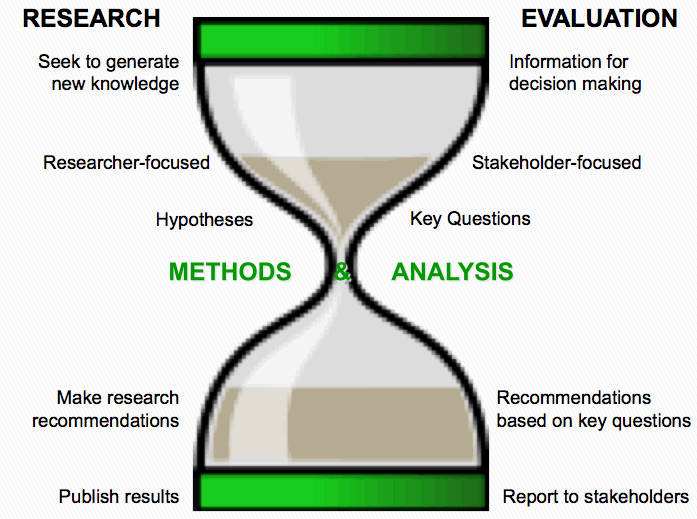Have you ever stayed up late, staring up at the night sky, wondering “What is the difference between evaluation and research?” No?! Well, even if you haven’t lost sleep pondering this, we think it’s an important topic. Why? In this blog series, we’ll be focused on how to do an evaluation: how to determine the value and impact of programs, services, and experiences. At the same time, we’ll be talking a lot about methods from social science research because those are our tools for collecting and analyzing data.
Knowing how evaluation and research relate to each other gives you a better understanding of where you are now, where you’re going, and how to get there as you work on a project. It’s like having a map in your head with a little star that says “you are here!”
Let’s start with clarifying what we mean by research. We might say that we’re going to research some recipes for dinner, or some interesting STEM activities for kids. In that context, research means “go find more information about.” When we talk about research in this post, we mean original research: when a study is designed to answer a question by methodically collecting and analyzing data.
Often original research happens at a university, within a specific discipline like physics, psychology, or history. In general, original research:
- aims to answer a question
- is based in a theory (a set of related ideas about how something works)
- tests a hypothesis (an idea about what will happen this time)
- comes to a conclusion that can be applied in a lot of situations (generalized)
- increases our overall knowledge on a topic
Evaluation and research do have commonalities. They’re both processes of inquiry, or ways of finding out more information in order to answer a question. So what makes them different? The answer to that can depend a bit on who you ask (a recent survey of 522 researchers and evaluators found that they had several ways of thinking about how research and evaluation relate).
For our purposes you just need to know which it is you are doing—evaluation or research? A broadly accepted way of thinking about how evaluation and research are different comes from Michael Scriven, an evaluation expert and professor. He defines evaluation this way in his Evaluation Thesaurus: “Evaluation determines the merit, worth, or value of things.” He goes on to explain that “Social science research, by contrast, does not aim for or achieve evaluative conclusions…Social science research does not establish standards or values and then integrate them with factual results to reach evaluative conclusions. In fact, the dominant social science doctrine for many decades prided itself on being value free.” This definition and more information are available at the Evaluation Exchange.
Put another way: evaluation and social science research use the same strategies to collect and analyze data, but the goals of each are different. A useful visualization of this concept, created by John LaVelle, is below.
Essentially evaluation aims to do exactly what it says—determine value. Did it work? Should we keep doing it or do something else instead? What was the value of what we did? Social science research, on the other hand, aims to maintain a more impartial stance—describe what is happening, as it is, and generally not judge or evaluate it as valuable or not.
As we move forward and learn more about the evaluation process, keep this idea in the back of your mind—that little “you are here!” star. We usually start an evaluation because we want to know if something is working and providing value in the way we hoped. Remembering that’s why you started and where you’re going can help you orient yourself throughout the project. We look forward to seeing you back here next time!

